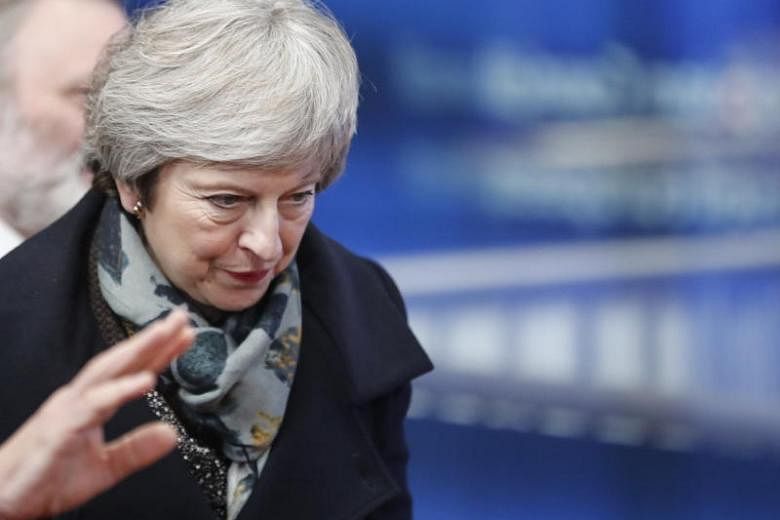LONDON - British Prime Minister Theresa May is facing a challenge to her leadership at the worst possible time: just when she was poised to set off for Brussels, where she planned to ask her European counterparts for some concessions in the deal they negotiated over Britain's departure from the European Union.
Mrs May still has a chance to retain the confidence of a majority of her MPs when they cast their ballots later in the evening on Wednesday (Dec 12). But the odds in favour of her political survival are narrowing, and even if she continues as Britain's prime minister after tonight's vote, it is doubtful whether she has the capacity to push through a deal over Brexit, as the process of Britain's separation from the EU is now popularly known.
Britain's ruling Conservatives have been divided for years over the EU question, with younger MPs being largely in favour of leaving it, while older ones tended to be more supportive of it. The 2016 referendum on the EU was meant to heal these divides; instead, the narrow majority for Brexit, which the referendum delivered, only helped to tear the Conservatives further apart.
Since she became prime minister in July 2016, Mrs May tried her best to heal the divides by appointing leading Brexiters such as Boris Johnson as foreign secretary. But her authority was seriously undermined by the botched early general election she called last year which, instead of consolidating the Conservatives' hold on power, ended up with Mrs May losing her overall parliamentary majority.
The Prime Minister's biggest problem, however, is that she mishandled the Brexit negotiations. She started by sounding tough, by laying down a number of "red lines" about what she would or won't accept as part of the separation talks with the European Union. However, she soon discovered that the Europeans not only had their own red lines, but also retained the initiative and held firm during the talks which followed.
The result of Mrs May's two years of fraught negotiations is a deal which satisfies nobody; those in favour of the EU dislike it because it still entails Britain leaving the Union, while Brexit supporters dislike it because the deal on offer still keeps Britain tied to EU regulations.
In short, Mrs May has succeeded in annoying everyone, in equal measures. A confrontation over her leadership became inevitable early this week, when the premier suddenly decided to stop the ratification of the Brexit deal in Parliament, largely because she knew the deal would be decisively rejected by a large majority of MPs.
Under the Conservative Party's own regulations, if 48 of its MPs express no confidence in the prime minister, a leadership vote has to take place. As a rule, such a vote among Conservative MPs takes some time to organise. But Sir Graham Brady, the chairman of the Conservatives in Parliament, admitted that, amid the chaos of Brexit, no time can be wasted, and that the Conservatives are "very keen the matter should be resolved as rapidly as possible".
But those who move in haste, may end up repenting at leisure. If Mrs May loses the vote of her MPs, she will remain as a caretaker prime minister while her party chooses a successor, who will become both party leader and Britain's new prime minister.
However, since the election of a new leader may involve the participation of the broader party membership, the earliest a new prime minister could emerge is mid-January, barely a few months before Britain is scheduled to leave the European Union, whether it has a negotiated deal or not. Brexit is scheduled to officially take place when the clock strikes midnight Central European Time on March 29, 2019.
The likeliest candidates for the succession are deemed to be Mr Jeremy Hunt, Britain's current Foreign Secretary, or Sajid Javid, the Home Secretary, who could become the first British leader in history to hail from a family of former immigrants.
Alternatively, Mrs May could just survive Wednesday evening's vote; all she needs is to gain a simple majority of at least 158 Conservative MPs to continue as leader. And, once the vote is over, Mrs May gains a certain immunity, since under existing rules she cannot be challenged again for at least a year.
Still, a victory by the narrowest of margins is unlikely to strengthen her authority. Nor is it likely to enhance her chances of extracting fresh concessions from her European counterparts. For although they are too polite to say it in public, most European leaders follow the machinations in London with a sense of amazement at how a nation famous for its political stability has now been transformed into Europe's least coherent one.












